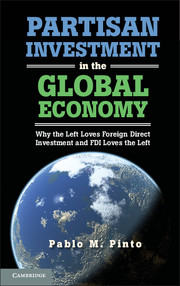 Partisan Investment in the Global Economy
Partisan Investment in the Global Economy Published online by Cambridge University Press: 05 March 2013
The broad paradigms that dominate the study of internationalization of the world economy suffer from a great weakness: they tend to neglect the interests of political actors or assume away their political strength. This book aims at overcoming this neglect. I develop a partisan theory of investment aimed at explaining why countries adopt different regimes toward foreign direct investment (FDI) and how these investment regimes change over time. Contrary to received wisdom, I argue that labor-based governments welcome foreign investment, whereas governments catering to domestic business interests oppose it.
My predictions are derived from a formal model that parallels the intuition from the political economy of trade. I build the model around the expected distributional consequences of investment flows, namely that inward FDI is likely to have a differential effect on the return to labor and capital in the receiving country. FDI can affect the relative demand for labor and business services: in general, FDI inflows are likely to decrease the return to capital and increase the return to labor. This prediction is the flip-side to the uncontroversial argument that outsourcing has a negative effect on wages and employment in the sending country. Workers and business owners are likely to organize politically in defense of their sources of income and support parties that better represent their interests. I predict that the party representing domestic capital opposes FDI, whereas the party of labor promotes inward investment flows.
To save this book to your Kindle, first ensure [email protected] is added to your Approved Personal Document E-mail List under your Personal Document Settings on the Manage Your Content and Devices page of your Amazon account. Then enter the ‘name’ part of your Kindle email address below. Find out more about saving to your Kindle.
Note you can select to save to either the @free.kindle.com or @kindle.com variations. ‘@free.kindle.com’ emails are free but can only be saved to your device when it is connected to wi-fi. ‘@kindle.com’ emails can be delivered even when you are not connected to wi-fi, but note that service fees apply.
Find out more about the Kindle Personal Document Service.
To save content items to your account, please confirm that you agree to abide by our usage policies. If this is the first time you use this feature, you will be asked to authorise Cambridge Core to connect with your account. Find out more about saving content to Dropbox.
To save content items to your account, please confirm that you agree to abide by our usage policies. If this is the first time you use this feature, you will be asked to authorise Cambridge Core to connect with your account. Find out more about saving content to Google Drive.